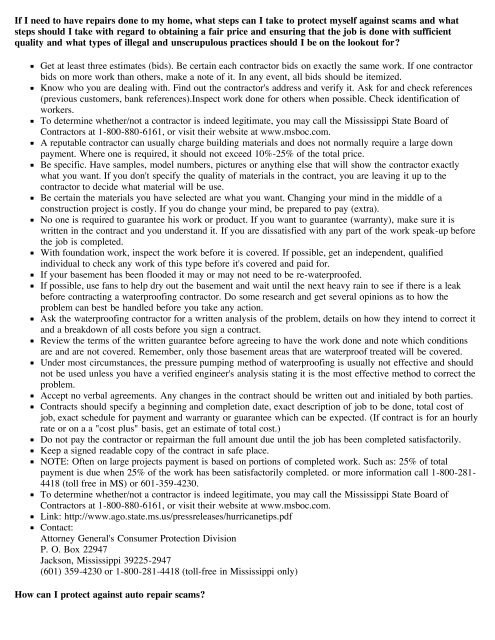Hurricane Katrina: Legal Issues - Columbus School of Law
Hurricane Katrina: Legal Issues - Columbus School of Law
Hurricane Katrina: Legal Issues - Columbus School of Law
You also want an ePaper? Increase the reach of your titles
YUMPU automatically turns print PDFs into web optimized ePapers that Google loves.
If I need to have repairs done to my home, what steps can I take to protect myself against scams and what<br />
steps should I take with regard to obtaining a fair price and ensuring that the job is done with sufficient<br />
quality and what types <strong>of</strong> illegal and unscrupulous practices should I be on the lookout for?<br />
Get at least three estimates (bids). Be certain each contractor bids on exactly the same work. If one contractor<br />
bids on more work than others, make a note <strong>of</strong> it. In any event, all bids should be itemized.<br />
Know who you are dealing with. Find out the contractor's address and verify it. Ask for and check references<br />
(previous customers, bank references).Inspect work done for others when possible. Check identification <strong>of</strong><br />
workers.<br />
To determine whether/not a contractor is indeed legitimate, you may call the Mississippi State Board <strong>of</strong><br />
Contractors at 1-800-880-6161, or visit their website at www.msboc.com.<br />
A reputable contractor can usually charge building materials and does not normally require a large down<br />
payment. Where one is required, it should not exceed 10%-25% <strong>of</strong> the total price.<br />
Be specific. Have samples, model numbers, pictures or anything else that will show the contractor exactly<br />
what you want. If you don't specify the quality <strong>of</strong> materials in the contract, you are leaving it up to the<br />
contractor to decide what material will be use.<br />
Be certain the materials you have selected are what you want. Changing your mind in the middle <strong>of</strong> a<br />
construction project is costly. If you do change your mind, be prepared to pay (extra).<br />
No one is required to guarantee his work or product. If you want to guarantee (warranty), make sure it is<br />
written in the contract and you understand it. If you are dissatisfied with any part <strong>of</strong> the work speak-up before<br />
the job is completed.<br />
With foundation work, inspect the work before it is covered. If possible, get an independent, qualified<br />
individual to check any work <strong>of</strong> this type before it's covered and paid for.<br />
If your basement has been flooded it may or may not need to be re-waterpro<strong>of</strong>ed.<br />
If possible, use fans to help dry out the basement and wait until the next heavy rain to see if there is a leak<br />
before contracting a waterpro<strong>of</strong>ing contractor. Do some research and get several opinions as to how the<br />
problem can best be handled before you take any action.<br />
Ask the waterpro<strong>of</strong>ing contractor for a written analysis <strong>of</strong> the problem, details on how they intend to correct it<br />
and a breakdown <strong>of</strong> all costs before you sign a contract.<br />
Review the terms <strong>of</strong> the written guarantee before agreeing to have the work done and note which conditions<br />
are and are not covered. Remember, only those basement areas that are waterpro<strong>of</strong> treated will be covered.<br />
Under most circumstances, the pressure pumping method <strong>of</strong> waterpro<strong>of</strong>ing is usually not effective and should<br />
not be used unless you have a verified engineer's analysis stating it is the most effective method to correct the<br />
problem.<br />
Accept no verbal agreements. Any changes in the contract should be written out and initialed by both parties.<br />
Contracts should specify a beginning and completion date, exact description <strong>of</strong> job to be done, total cost <strong>of</strong><br />
job, exact schedule for payment and warranty or guarantee which can be expected. (If contract is for an hourly<br />
rate or on a a "cost plus" basis, get an estimate <strong>of</strong> total cost.)<br />
Do not pay the contractor or repairman the full amount due until the job has been completed satisfactorily.<br />
Keep a signed readable copy <strong>of</strong> the contract in safe place.<br />
NOTE: Often on large projects payment is based on portions <strong>of</strong> completed work. Such as: 25% <strong>of</strong> total<br />
payment is due when 25% <strong>of</strong> the work has been satisfactorily completed. or more information call 1-800-281-<br />
4418 (toll free in MS) or 601-359-4230.<br />
To determine whether/not a contractor is indeed legitimate, you may call the Mississippi State Board <strong>of</strong><br />
Contractors at 1-800-880-6161, or visit their website at www.msboc.com.<br />
Link: http://www.ago.state.ms.us/pressreleases/hurricanetips.pdf<br />
Contact:<br />
Attorney General's Consumer Protection Division<br />
P. O. Box 22947<br />
Jackson, Mississippi 39225-2947<br />
(601) 359-4230 or 1-800-281-4418 (toll-free in Mississippi only)<br />
How can I protect against auto repair scams?

















